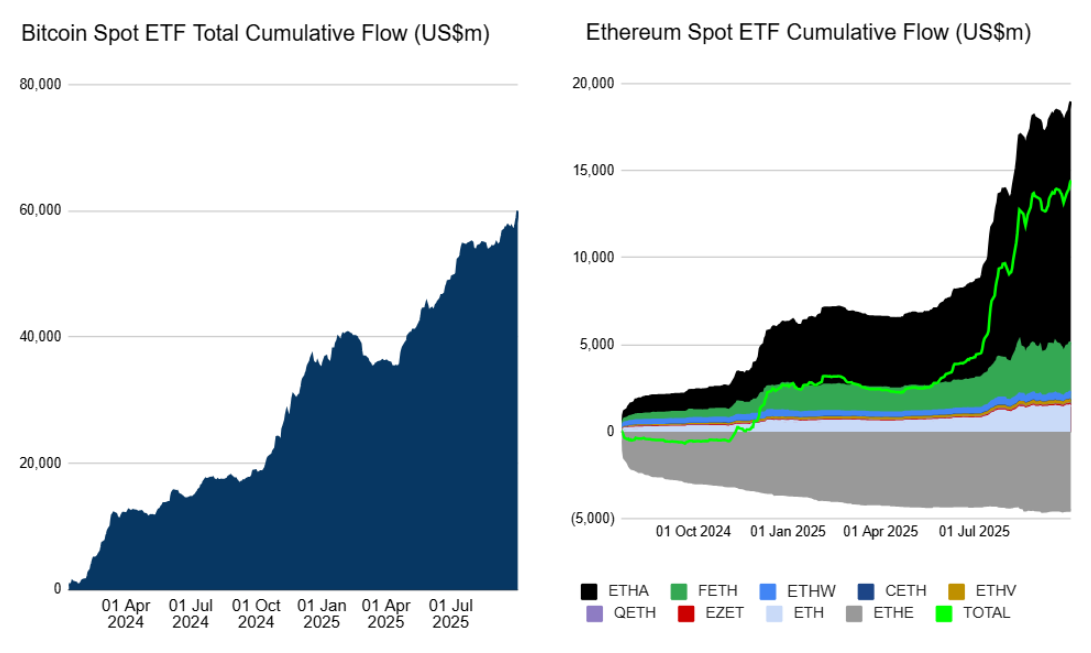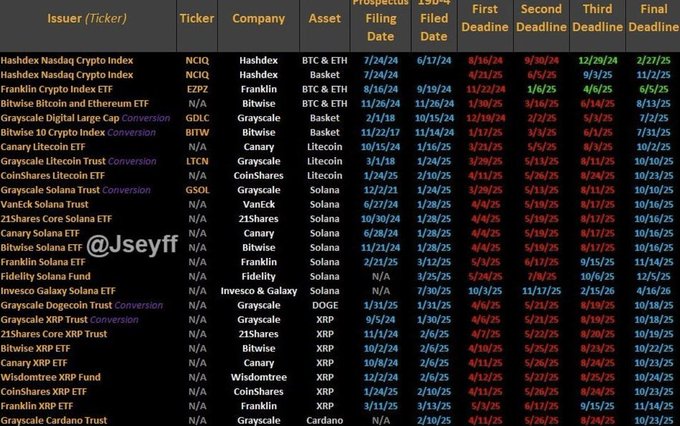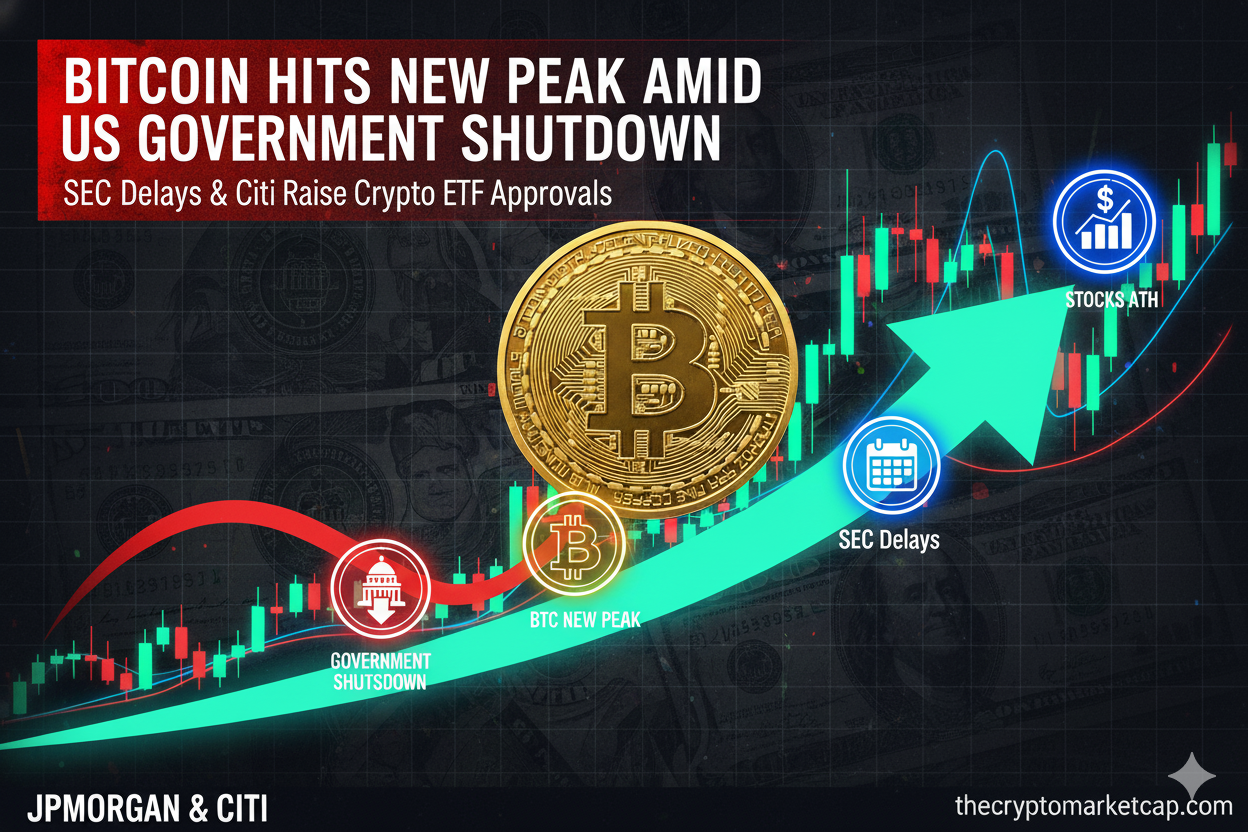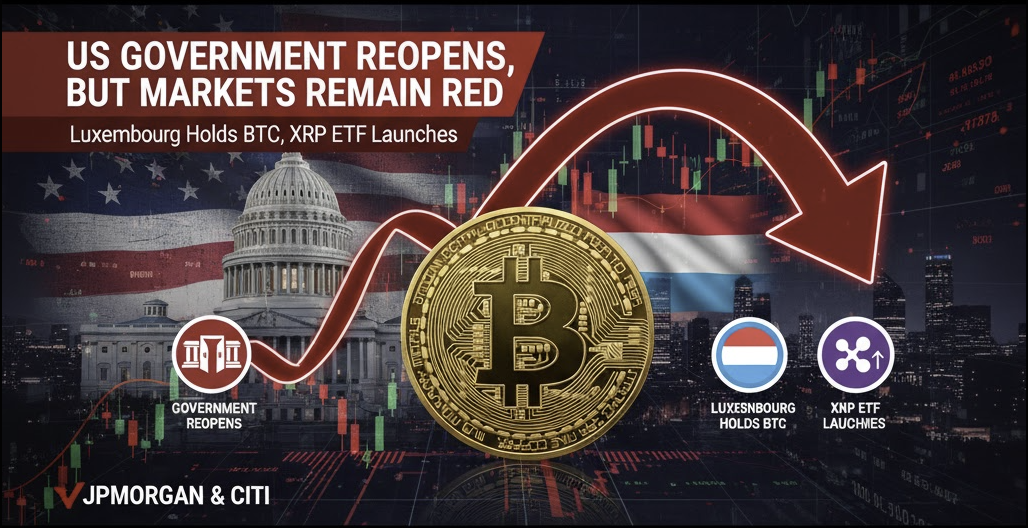Bitcoin continues to rise, setting a new all-time high, injecting vibrancy into the market even as the US government remains shut down. Concurrently, altcoin ETF applications are being delayed due to the government's limited operation.
Bitcoin Hits New Peak Amid US Government Shutdown | SEC Delays Crypto ETF Approvals
Market Overview
US stock futures for Sunday (October 5th, US) saw gains across all three indices. Gold futures also continued to climb, reaching $3954 per ounce. Oil rose slightly to $61.8 per barrel.

Bitcoin surged to a new peak of $125,700 before settling back around $123,000. Major altcoins saw mixed results, with some gaining slightly and others seeing minor dips. The overall crypto market capitalization increased to $4.32 trillion.

This week holds several notable economic reports, such as the US trade deficit and weekly jobless claims. However, in reality, most of this data may be delayed or postponed due to the ongoing US government shutdown. The market is still awaiting the minutes from the Fed's FOMC meeting, which are typically released three weeks after the last interest rate decision, to see if Fed Chair Jerome Powell's statements align with the minutes. Additionally, ECB President Christine Lagarde is expected to deliver a speech this week. Amidst the US government shutdown, White House economic advisor Kevin Hassett stated that layoffs of federal employees will begin if President Donald Trump decides that negotiations to end the government shutdown are "absolutely going nowhere." Hassett expressed optimism that negotiations this week could resolve the deadlock.
ETF Flows and Price Dynamics
One of the most crucial factors currently impacting the market is ETF capital flow. Many investors remain skeptical when they see occasional negative ETF flows while Bitcoin and Ethereum prices still rise, or vice versa. However, this can be explained by the specific operational mechanisms of ETFs and the OTC (over-the-counter) market.

Following major collapse events in 2022 like FTX, BlockFi, and Voyager, investor confidence in crypto exchanges was severely damaged. Although reputable exchanges like Gemini and Coinbase did not face issues, many people still remain wary of holding assets directly on them. The emergence of Bitcoin ETFs, issued by major financial institutions like BlackRock, Fidelity, and Franklin Templeton, opened the door to a new influx of capital—the traditional investor demographic that is familiar with the stock market and seeks to invest in crypto through safe, regulated channels. ETFs thus became a bridge for new capital to flow into the market. When the market is positive, inflows are strong; when the market is weak, capital is withdrawn. However, the overall trend is one of net inflows gradually increasing over time, reflecting long-term conviction in digital assets.
The influence of ETFs on the Bitcoin price is not immediate, as most transactions are executed in the OTC market—where large institutions buy and sell in bulk, with minimal direct impact on the spot price. However, when OTC demand exceeds available supply, funds are forced to buy directly on spot exchanges, thereby creating a price appreciation effect. Recently, Bitcoin ETFs recorded five consecutive days of positive inflows, with Friday's inflow alone nearing $1 billion, indicating that buying pressure is returning.
The Stalled Progress of New ETF Approvals
October and November are critical periods when many spot ETF applications are hitting their final deadlines. By rule, the SEC has a maximum of eight months to approve or reject an application. However, the process is currently stalled due to the temporary US government shutdown and limited personnel working during this time. Currently, 16 spot ETF applications are pending, including the Litecoin ETF by Canary Capital, the Ethereum ETF by Grayscale, and the Solana ETF by ARK Invest. Although the SEC has established a unified standard for crypto ETFs, applications still require approval at two levels:

- Form 19b-4: Allows the listing of the new ETF type on an exchange.
- Form S-1: Approves the detailed issuance by each company (fees, management mechanisms, price tracking methods, etc.).
Therefore, even with standards in place, the SEC still needs time to process each application. When the government reopens, the expectation is that many ETFs will be approved simultaneously, expanding the investment catalogue to Ethereum, Solana, and other assets. In the meantime, Bitwise has also filed an S-1 prospectus with the SEC to seek approval for an APT token ETF. The SEC is currently reviewing 16 spot crypto ETF applications with deadlines in October. However, the process may be delayed due to the temporary US government shutdown, which is causing the SEC to operate with limited staff and is preventing timely approval of the S-1 filings. Overall, ETF capital flow is currently a major influencing factor in the crypto market. While it does not immediately impact the price, ETFs provide sustainable, legitimate capital that validates Bitcoin and crypto in the eyes of traditional investors. Along with the process of approving new funds, ETFs will continue to contribute to the crypto market's growth cycle.
Other Key Crypto & Political Updates
Trump argues that the US financial system has been outdated for decades, making payments and transfers costly and slow. He declared that if re-elected, he will upgrade the entire system to a 21st-century standard using crypto technology, and he crowned himself the "first crypto president."
Tether is partnering with Antalpha to raise at least $200 million for a digital asset fund focused on tokenized gold. The fund will accumulate Tether Gold (XAUT)—a token backed by physical gold in Switzerland, currently with a market capitalization of nearly $1.5 billion. As of June 2025, Tether owns $8.7 billion in gold. This move expands Tether's strategy beyond USDT and Bitcoin, aiming for a company valuation of $500 billion.
African citizens, particularly in Kenya and Nigeria, are increasingly using stablecoins like USDT and USDC to hedge against inflation, save on transfer fees, and make payments via mobile wallets. In Nigeria, stablecoin transfer fees are only about 4%, compared to the traditional 8.45%. Stablecoins currently account for 40–43% of regional crypto transactions, with Tron being the most popular network due to its low cost and high speed.
A US court ruled that the BAYC NFT and APECOIN are not securities under the Howey test, as there was no common enterprise or expectation of profit derived from Yuga Labs' efforts. NFTs are deemed digital collectibles, not investments, setting an important legal precedent for the entire market.
The crypto project linked to the Trump family, WLFI, sold 100 million tokens to Hut 8 for $25 million ($0.25/token), which is 25% higher than the market price. Hut 8 will hold them as a long-term reserve. The two parties are also collaborating on the "American Bitcoin" mining project. WLFI plans to expand into asset tokenization, raise additional capital, and launch a debit card application with the USD1 stablecoin payment feature.
Sources
- The New York Times
- Fox Business
- Bloomberg
- SEC
- CFTC Official Announcements
- Tether Transparency Report
- Coinbase Official Announcements
- World Liberty Financial (Zack Witkoff, Token2049)
- IRS and Treasury Department Guidance
- Henley & Partners Report
- Forbes
- GiveDirectly
Disclaimer
This article is for informational purposes only and should not be considered financial advice. Please do your own research before making investment decisions.


.png)





